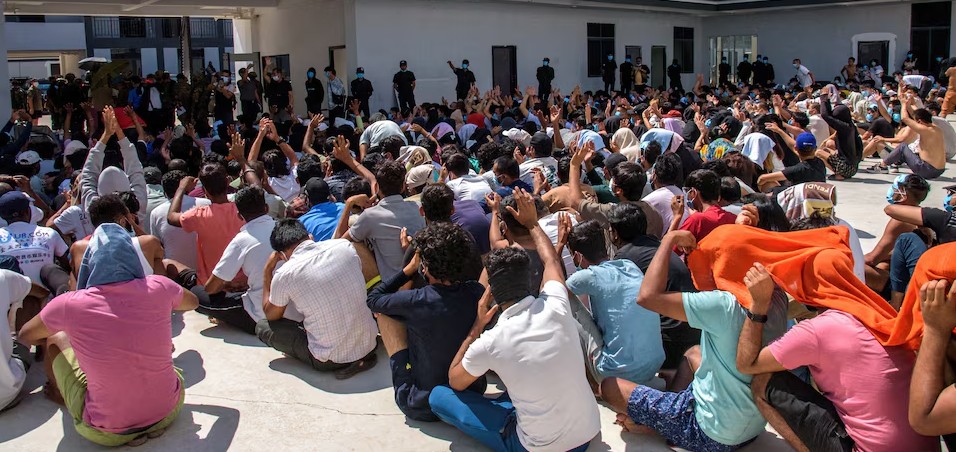IOM warns of global crisis as migrants, children forced into crime by traffickers

The International Organisation for Migration (IOM) has called for urgent, coordinated action to tackle one of the most overlooked forms of human trafficking: forced criminality.
In a statement, IOM warned that many vulnerable individuals—including migrants, youth, and children—are being coerced by organised crime groups into committing crimes through manipulation, threats, and violence.
These crimes range from cyber fraud and online scams to drug trafficking and theft—acts that, according to IOM, “are not driven by intent” but “are the product of deception and exploitation.”
The organisation drew attention to situations in Southeast Asia, where hundreds of thousands are believed to be held in scam compounds and forced into criminal activity.
“These individuals are isolated, abused, and stripped of agency. Even after rescue or escape, many continue to face criminal records, social stigma, and systems that treat them as offenders rather than survivors. The trauma endures long after exploitation ends,” the organisation said.
Forced criminality
IOM Director-General Amy Pope emphasised that forced criminality is also a key driver of organised crime, generating an estimated USD 40 billion each year.
“Traffickers profit not only from criminal acts committed under coercion but from justice systems that criminalise victims while enabling impunity. When survivors are prosecuted, they are denied essential support, while perpetrators remain protected by systemic failures and inaction,” she said.
IOM also noted that many victims are lured with false promises of employment and then forced into criminal activity under conditions akin to modern-day slavery.
“Trafficking in persons is a human rights crisis. But it’s more than that. It’s a massive global business that fuels corruption, spreads fear, and preys on the most vulnerable. Until we start protecting people who’ve been exploited, instead of punishing them, we aren’t making progress against trafficking in persons,” Pope added.
IOM is urging governments, international partners, and communities to act collectively and decisively.
It stressed that protection, justice, and long-term support must be prioritised, and survivors must be recognised as individuals whose rights have been violated and whose futures depend on society’s commitment to dignity and justice.
“Governments must uphold the non-punishment principle and ensure that National Referral Mechanisms are not merely bureaucratic processes but lifelines that provide protection, legal aid, and reintegration support. Recognising survivors as victims and not criminals is not only a moral obligation but a strategic necessity in dismantling trafficking networks,” the organisation said.
According to IOM data, one in every three trafficking victims is a child, and 78 per cent are trafficked for forced labour or sexual exploitation.
The organisation added that conflict, natural disasters, and poverty continue to create conditions ripe for exploitation, increasing the risks for millions already in vulnerable situations.
In a statement, IOM warned that many vulnerable individuals—including migrants, youth, and children—are being coerced by organised crime groups into committing crimes through manipulation, threats, and violence.
These crimes range from cyber fraud and online scams to drug trafficking and theft—acts that, according to IOM, “are not driven by intent” but “are the product of deception and exploitation.”
The organisation drew attention to situations in Southeast Asia, where hundreds of thousands are believed to be held in scam compounds and forced into criminal activity.
“These individuals are isolated, abused, and stripped of agency. Even after rescue or escape, many continue to face criminal records, social stigma, and systems that treat them as offenders rather than survivors. The trauma endures long after exploitation ends,” the organisation said.
Forced criminality
IOM Director-General Amy Pope emphasised that forced criminality is also a key driver of organised crime, generating an estimated USD 40 billion each year.
“Traffickers profit not only from criminal acts committed under coercion but from justice systems that criminalise victims while enabling impunity. When survivors are prosecuted, they are denied essential support, while perpetrators remain protected by systemic failures and inaction,” she said.
IOM also noted that many victims are lured with false promises of employment and then forced into criminal activity under conditions akin to modern-day slavery.
“Trafficking in persons is a human rights crisis. But it’s more than that. It’s a massive global business that fuels corruption, spreads fear, and preys on the most vulnerable. Until we start protecting people who’ve been exploited, instead of punishing them, we aren’t making progress against trafficking in persons,” Pope added.
IOM is urging governments, international partners, and communities to act collectively and decisively.
It stressed that protection, justice, and long-term support must be prioritised, and survivors must be recognised as individuals whose rights have been violated and whose futures depend on society’s commitment to dignity and justice.
“Governments must uphold the non-punishment principle and ensure that National Referral Mechanisms are not merely bureaucratic processes but lifelines that provide protection, legal aid, and reintegration support. Recognising survivors as victims and not criminals is not only a moral obligation but a strategic necessity in dismantling trafficking networks,” the organisation said.
According to IOM data, one in every three trafficking victims is a child, and 78 per cent are trafficked for forced labour or sexual exploitation.
The organisation added that conflict, natural disasters, and poverty continue to create conditions ripe for exploitation, increasing the risks for millions already in vulnerable situations.
Human Trafficking
migrant crisis
IOM
International Organisation for Migration
child traffickers
Let’s Connect
We’re here to listen, support, and engage with you.
Whether it’s feedback, a request, or collaboration — Hon. Yusuf Hassan’s team welcomes your message.
Office Address
Kamukunji Constituency Office, Nairobi
Call
+254 737 500200, +254 716 667733
“Leadership is not about position — it’s about purpose, people, and progress.”